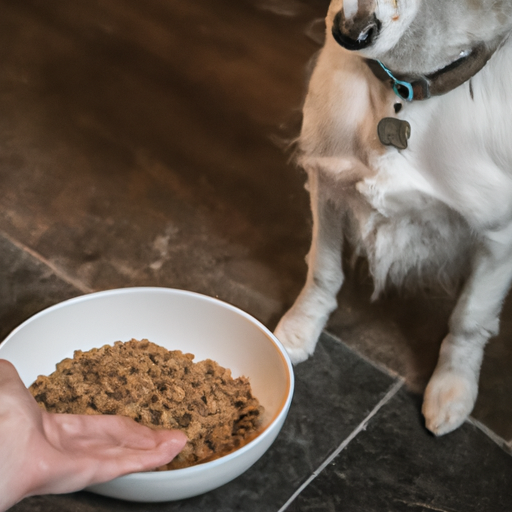Feeding your furry friend isn’t as straightforward as pouring a bag of kibble into a bowl. We’re here to guide you through the process with care and expertise.
Understanding Your Dog’s Nutritional Needs
Every dog, like every human, has unique dietary requirements. The breed, age, weight, and overall health status are all factors that contribute to these requirements.
- Puppies generally need a higher protein diet to support their rapid growth.
- Adult dogs need a balanced diet that includes proteins, carbohydrates, fats, vitamins, and minerals.
- Senior dogs often require a diet that’s low in calories but high in fiber, and packed with age-appropriate vitamins and minerals.
Choosing the Right Dog Food
The market is flooded with a variety of dog foods, and it can be challenging to choose the right one. Here’s what you should look for:
- High-quality ingredients: The first ingredient listed should be a whole meat source, such as chicken, beef, or fish.
- No by-products or fillers: By-products and fillers provide little nutritional value.
- No artificial colors, flavors, or preservatives: Natural is always better.
| Type of Dog Food | Pros | Cons |
|---|---|---|
| Dry Food | Convenient, long shelf-life, good for dental health | May contain more preservatives |
| Wet Food | High in protein and moisture, good for hydration | Expensive, short shelf-life |
| Raw or Homemade Food | Control over ingredients, may be more palatable | Time-consuming, potential health risks if not balanced properly |
Feeding Frequency and Portion Sizes
Overfeeding can lead to obesity, while underfeeding can result in nutritional deficiencies. Most vets recommend feeding adult dogs twice a day. Puppies, due to their small stomachs, require more frequent feedings.
Portion sizes depend on your dog’s size, breed, and activity level. Always refer to the feeding guidelines on your dog’s food packaging and adjust as needed.
Human Foods: The Good, The Bad, The Toxic
While it’s tempting to share your dinner with your furry friend, not all human foods are safe for dogs.
- Safe to share: Carrots, blueberries, cucumbers, cooked chicken, and rice.
- Avoid: Onions, garlic, chocolate, grapes, and raisins.
Special Considerations: Allergies and Health Conditions
Some dogs may have food allergies or health conditions that require a special diet. Always consult with your vet if you notice symptoms such as excessive itching, digestive issues, or changes in behavior.
Frequently Asked Questions
Q: Can I feed my dog a vegetarian or vegan diet?
A: Dogs are omnivores and can survive on a carefully planned vegetarian or vegan diet. However, it’s challenging to meet all their nutritional needs without animal products. Always consult a vet or a pet nutrition expert before making this decision.
Q: How often should I change my dog’s diet?
A: Unless there’s a specific health reason, it’s best to keep your dog’s diet consistent. Sudden changes can cause digestive upset.
Q: Is it okay to feed my dog table scraps?
A: Occasional healthy table scraps are okay, but they shouldn’t make up more than 10% of your dog’s diet. Avoid foods that are toxic to dogs.
Remember, feeding your dog is more than just a task to check off your daily to-do list. It’s an act of love and care. Research, consult with professionals, and pay attention to your dog’s individual needs. Here’s to many happy, healthy meals together!



